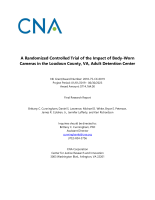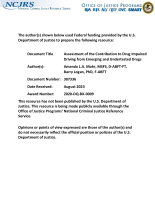Research methods
Exploring Officer Patrol Behaviors Using Automated Vehicle Locator and Body-Worn Camera Data in Kansas City, Missouri
A Micro-and Macro Evaluation of the Effectiveness of Extreme Risk Protection Orders in Colorado
A Randomized Controlled Trial of the Impact of Body-Worn Cameras in the Loudoun County, VA, Adult Detention Center
Understanding and Refining Violence Intervention Implementation: St. Louis (MO) as a Crucial Case
Research & Evaluation of Boston's Community Violence Intervention & Prevention Initiative
The sexual assault microbiome: Detecting contact when minimal male DNA is present.
Implementation of a Capacity-Building Framework to Improve School Climate in an Urban School System
Perceptions of White-Collar Crime Seriousness: Unpacking and Translating Attitudes into Policy Preferences
A Mixed-Method Examination of the Effectiveness of Money Bail and other Pretrial Release Options
Elder Abuse Survivor Equity (EASE) Study: National Longitudinal Trajectories and Translation for Practitioners and the Public
Implementation of NPS Discovery – An Early Warning Systems for Novel Drug Intelligence, Surveillance, Monitoring, Response, and Forecasting using Drug Materials and Toxicology Populations in the US
Cannabis liberalization policies and trends in cannabis-related school-based discipline: Examining sociodemographic disparities in Massachusetts
The Mortal Tragedy: Analyzing Body Disposal Patterns in Homicide Cases
Inclusive Research: Engaging People Closest to the Issue Makes for Better Science & Greater Impact; 2023 NIJ Research Conference Plenary
This panel will discuss what inclusive research is, how to conduct it, and what issues and challenges exist about engaging in it. “Inclusive research” has its history as a participatory research method designed to ensure people closest to the issue or problem under study are authentically engaged in the research process rather than simply being “research subjects.” While community-based participatory research has begun to take on greater prominence in the criminal justice realm, such efforts are largely confined to qualitative research inquiries.
See the YouTube Terms of Service and Google Privacy Policy
A longitudinal quasi-experimental study of violence and disorder impacts of urban CCTV camera clusters
Can Science Enhance Equity? Findings and Implications From a Study To Detect Bruising on Victims with Dark Skin Pigmentation
This plenary panel from the 2023 NIJ Research Conference features fascinating research on a methodology to improve the detection and documentation of bruises on victims of violence who have dark skin pigmentation. This study highlights the intersection between science, justice, and racial equity, featuring practitioner and victims’ advocacy perspectives. The discussion describes the research and its findings and explore strategies to ensure that this particular evidence-based methodology can be widely implemented by nurse practitioners in the field.
Participants:
See the YouTube Terms of Service and Google Privacy Policy




